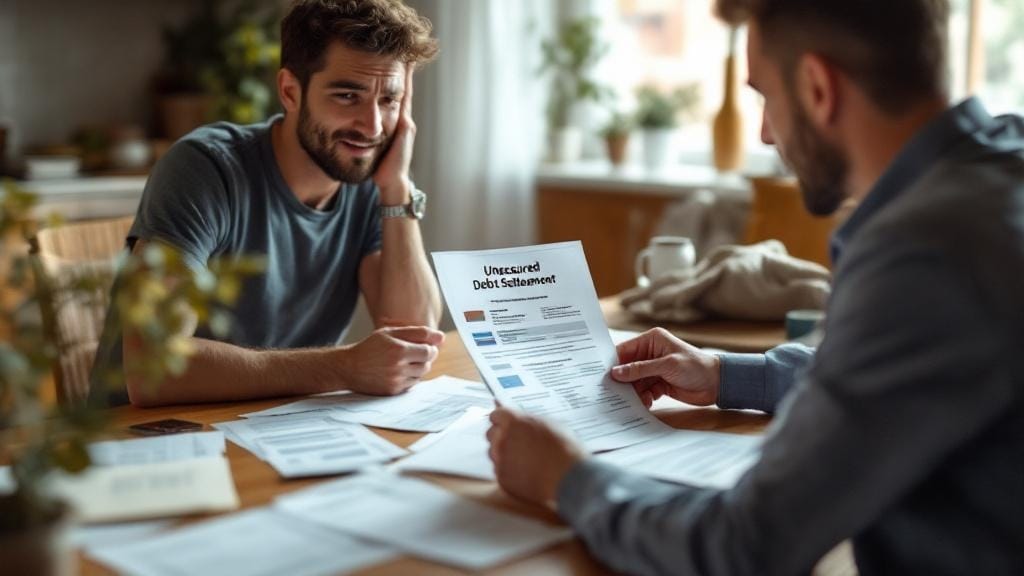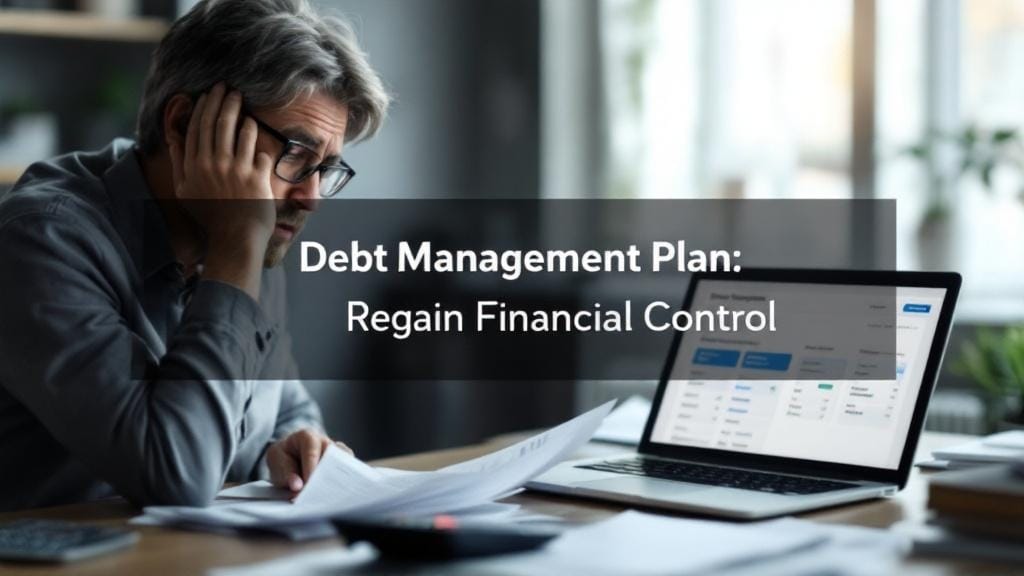What Is Unsecured Debt Settlement?
Unsecured debt settlement is the process of negotiating with creditors to reduce the total amount owed on unsecured debts—like credit cards, medical bills, or personal loans—often without filing for bankruptcy. If you’re drowning in high-interest debt and can’t keep up with payments, this strategy could provide relief.
Unlike secured debt (like a mortgage or auto loan), unsecured debt has no collateral backing it. That means lenders can’t seize your property if you default—but they can send your account to collection agencies, report missed payments to credit bureaus, or file lawsuits.
Settling unsecured debts allows you to pay a lump sum (usually less than the full amount owed) or enter into a structured unsecured debt payment plan. Done right, it helps you avoid bankruptcy, stop collection calls, and reclaim financial control.
Why People Choose Unsecured Debt Settlement
Here are some common reasons why debt settlement becomes an attractive option:
High balances with credit card debt and medical bills
Interest rates spiraling out of control
Experiencing financial hardship assistance needs due to job loss or illness
Wanting to avoid bankruptcy and its long-term consequences
Multiple accounts in collections
Looking for fast unsecured debt forgiveness options
Types of Debts You Can Settle (Unsecured Only)
Debt settlement only applies to unsecured debts. Here’s a quick breakdown:
✅ Eligible for Settlement:
Credit card debt
Medical bills
Personal loans (unsecured)
Payday loans
Store credit cards
❌ Not Eligible for Settlement (Secured Debt):
Mortgages
Auto loans
Federal student loans (though options exist separately)
How the Unsecured Debt Settlement Process Works
Step 1: Review Your Financial Situation
Start by assessing:
Your total unsecured debt
Income and monthly expenses
Assets and liabilities
Ability to make lump-sum or installment payments
This will determine whether a debt repayment plan or lump-sum offer is better for your situation.
Step 2: Choose DIY or Professional Help
You can either:
DIY Debt Negotiation: Contact creditors yourself
Hire professional unsecured debt advisors or a debt settlement company
⚠️ Tip: Always check debt settlement companies reviews and confirm that they are FTC-compliant and don’t charge upfront fees.
Step 3: Stop Payments Temporarily (If Strategizing)
Some settlement approaches involve pausing payments to demonstrate hardship and negotiate from a stronger position. This can hurt your credit short-term but may speed up the settlement process.
Step 4: Negotiate and Settle
Creditors may accept:
30% to 60% of the balance as a lump sum
Structured unsecured debt payment plans over 6–36 months
Use terms like:
“Financial hardship”
“Minimum debt settlement amount”
“Interest rate reduction”
Step 5: Get It in Writing
Always demand a written agreement before making a payment. This protects you from being chased later for the remaining amount.
Step 6: Make the Payment(s) and Track the Results
Once payment is made, the creditor should:
Mark the debt as “Settled” or “Paid for less than full balance”
Stop all collection efforts
Provide a zero balance statement
Pros and Cons of Unsecured Debt Settlement
✅ Pros:
Significant debt reduction (often 40%–60%)
Avoids bankruptcy
Stops collection harassment
Clears debt faster than minimum payments
❌ Cons:
Temporary credit score drop
Possible tax consequences (for forgiven debt)
Not all creditors will settle
Risk of scams if using shady unsecured debt resolution companies
Real-Life Example: How Lisa Settled $25K in Credit Card Debt
Lisa, a freelance designer, racked up $25,000 in credit card debt after a medical emergency. She was making minimum payments and getting nowhere.
She consulted a professional unsecured debt advisor, who helped her negotiate lump-sum settlements with five creditors. Within 14 months, she settled all accounts for a total of $11,000—less than half—and avoided bankruptcy.
Her credit took a hit initially but started recovering within a year.
Do You Need Legal Help for Unsecured Debt?
Sometimes, yes.
Legal help for unsecured debt can be useful when:
You’re being sued by a creditor
Creditors violate the Fair Debt Collection Practices Act
You want to understand tax liabilities
You’re considering debt settlement as part of a broader debt relief option
Consumer law attorneys or nonprofit credit counselors can guide you in such cases.
Private Unsecured Debt Settlement Help: When to Consider It
Private firms offer fast unsecured debt settlement plans, often advertising quick results. Be cautious:
Check for:
No upfront fees
Transparent fee structures (usually 15–25% of settled debt)
Accreditations (e.g., AFCC, IAPDA)
Honest timelines (usually 12–48 months)
Avoid anyone promising to erase debt overnight or misrepresenting unsecured vs secured debt.
Alternatives to Unsecured Debt Settlement
If settlement isn’t right for you, consider these debt relief options:
Debt Management Plans (DMPs): Work with a nonprofit credit counseling agency to reduce interest rates and structure payments
Debt Consolidation Loans: Combine multiple debts into one lower-interest loan
Credit Counseling: Learn budgeting and financial strategies
Bankruptcy: A last resort, but can offer full discharge in some cases
How to Reduce Unsecured Debt Without Settlement
Not ready to settle? Try these proactive steps:
Snowball Method: Pay off the smallest debts first
Avalanche Method: Pay off the highest-interest debts first
Negotiate for interest rate reduction
Seek financial hardship assistance programs
Use windfalls (tax refunds, bonuses) for debt payments
FAQs About Unsecured Debt Settlement
1. Can I settle unsecured debt without hurting my credit?
It’s possible, but not typical. Debt settlement usually impacts your credit because you stop making full payments. However, it’s still better than a bankruptcy in many cases, and your credit can recover within a couple of years.
2. What’s the minimum debt settlement amount creditors accept?
Creditors often accept between 30%–60% of the balance. It depends on the type of debt, how long it’s been delinquent, and whether a collection agency owns it.
3. Are all debt settlement companies legit?
No. Read debt settlement companies reviews and check for certifications. Avoid any company that asks for payment before delivering results.
4. Is credit card debt settlement different from other unsecured debt settlement?
It’s similar, but credit card issuers may have specific settlement departments. Credit card debt settlement (unsecured) is one of the most common forms.
5. How long does unsecured debt settlement take?
On average, 12 to 48 months, depending on your payment capacity and number of creditors.
6. Can I settle debt myself or do I need a company?
Yes, you can DIY. But if you’re overwhelmed or unsure how to negotiate, hiring unsecured debt resolution companies or legal help can streamline the process.
7. Is there any risk in debt settlement?
Yes. Besides the credit impact, forgiven debt over $600 may be taxed as income. Always consult a tax advisor or lawyer before proceeding.
Conclusion: Regain Control with Smart Unsecured Debt Settlement
Unsecured debt settlement can be a powerful tool to get your finances back on track without declaring bankruptcy. Whether you tackle it alone or work with a trusted professional unsecured debt advisor, the key is to take action early.
By understanding your options—like credit card debt settlement, unsecured debt payment plans, and debt relief alternatives—you can reduce your financial stress and start rebuilding toward a debt-free future.








Comments (0)